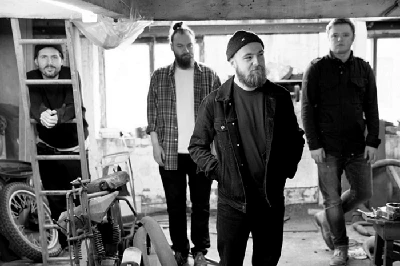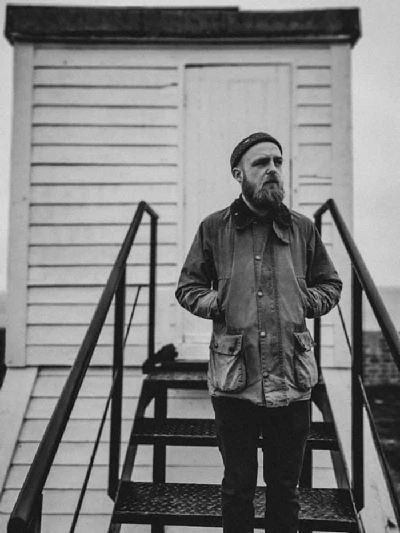published: 10 /
4 /
2020

Singer-songwriter Aaron Duff, the frontman with rising North East-based act Hector Gannet, speaks to John Clarkson about his band's political conscience, the influence of their local environment and history on them and the documentary film that kickstarted their career.
Article
Hector Gannet have been attracting increasing notice from music fans in their native North of England over the past year.
Centred around vocalist and guitarist Aaron Duff, they are both a solo project and a band, and, also featuring Jack Coe (drums), Joe Coady (bass) and Martin Wann (guitar/vocals), toured the UK with Sam Fender, who Duff had been at school with, last March.
They have released three singles to date. Their debut, the nine-and-a-half minute ‘The Haven of St Aidan’s’, is an account of female heroism and tells with soaring dynamics the story of Grace Darling, a lighthouse keeper’s daughter who in 1838 helped to save the lives of nine members of the crew of a boat ‘Forfarshire’ after it was shipwrecked on the Farne Islands off the coast of Northumberland. ‘All Hail, All Glory’, the only one of the releases to receive a CD release to date, is similarly thrilling and textured, a jangling indie pop anthem which combines Duff’s own lyrics with those of Wilfred Owen’s in his war poem, ‘Dulce et Decorum Est'. Most recently there has been ‘Dead Nag’, a bittersweet ballad which reflects on the media’s cynical manipulation of the public as a whole.
Pennyblackmusic spoke to Aaron Duff about Hector Gannet, and ‘Moving North Coastal, a documentary on North East England which kickstarted his band’s career.
PB: It seems that the past is as important as the present to Hector Gannet. You take your name from a boat that your grandfather worked on which sunk whilst rescuing people from an oil rig platform in 1968, and all three of your singles to date deal with the past in some way. Why do you think that is?
AD: I think that the past is really important to the future in many ways. It can teach you a lot. There are important issues in the past that we can learn a lot from, particularly in the current climate that we find ourselves in.
PB: Hector Gannet are frequently described as being politically or socially conscious. Is that something which you set out to be with each song or is something that evolves?
AD: I don’t know that I set out to do that with every song. A lot of the songs have a message behind them, but i don’t think that every one has a sort of rallying cry behind them. I wouldn’t say that every song has got a conscious message behind it. Each song is different. I don’t think that they are all politically charged. We have found ourselves put into that bracket because of the issues that I have dealt with in the lyrics in the songs we have released so far.
PB: The band was formed after you were asked to contribute to the soundtrack of a film ‘Moving North CoastaL’. What was that film about?
AD: The original footage belongs to the North East Film Archive, and, to cut a long story short, I found some footage in it of my grandparents who were involved in the fishing industry from North Shields, which is where I am from. I was really inspired by it. At the time I had just finished with my previous band, so I was at a loose end musically and that kickstarted Hector Gannet for me.
I wrote this piece of music for this footage, and the North East Film Archive got hold of it, and asked if I would be interested in using some more of the footage to write a forty-five minute soundtrack. The footage is all to do with the North East coast, the heritage of the area, the industry and the natural and historical footage of it. There is a lot of footage in it of North Northumberland, the Farne Islands and Holy Island, so I started to spend a lot of time in that area and got engrossed in the history, and the story of Grace Darling played a big role in it. So, I became influenced by a lot of things around the area, and I think that has gone on to influence more of my music since. It has definitely played a role in defining Hector Gannet as a band.
PB: You come across as very much a band from the North. Do you see your roots as your prime influence then?
AD: Yeah, definitely. You can’t get away from who you are, I think, and it has to be personal the music or otherwise it doesn’t really mean anything. I would struggle to live with a song that wasn’t personal or that I hadn’t put everything into it, so my roots play a big role in the music because I am so passionate about it and the area and where I come from.
PB: With ‘Moving North Coastal’, did ‘the Haven of St Aidan’s’ become part of that soundtrack or was it something different?
AD: It came out of that. The lyrics and the music were influenced by the Grace Darling story. I wrote the music to the footage with my grandparents, not really envisaging that it would lead to anything else really, and ‘The Haven of St Aidan’s' was the next step. That is why it ended up at nearly nine-and-a-half minutes long because it was originally a piece of that soundtrack piece. It became part of our live set, so when we weren’t playing to the footage it was in the set.
PB: It is quite a bold thing to release as your first single something which is so long. Was that done intentionally with the aim of starting Hector Gannet with a bang?
AD: In a way I suppose that it was. We were planning on that being almost a soft release to lead in the proper first single which was ‘All Hail, All Glory’ but a lot of people took it as being the first release anyway. Obviously I knew that it wasn’t going to get much radio play being nearly ten minutes long, but people have been very attentive when listening to it.
PB: ‘All Hail, All Glory’ takes some of its lines from the Wilfred Owen poem ‘Dulce et Decorum Est’, which is a poem a lot of people are familiar with. Was that why you decided to use those lines because they were so familiar?
AD: I love the poem. It has an incredibly powerful message about the futility of war and the fragility of life. The song tips its hat to those who have fallen and to anyone who has fought and lost their life in any sort of struggle. By using my words against those of Wilfred Owen I was empathising with that poem and trying to put a new spin on what he saying.
It was written a hundred years ago, but the points which it made are still relevant and that is really scary. I was trying to put across as well that we are living in really dangerous times, and the media and politicians will use a lot of propaganda to kind of incite hate now, which is terrifying.
PB: That ties in as well with the new single, ‘Dead Nag’, which is a reflection upon the ways in which we are all manipulated by politicians and the media. Is that song a direct reflection on Brexit or is it a more general statement?
AD: It is a more general statement. To be honest, that song took a very long time to write. I wrote the first verse as a reaction to the beginning of Brexit. That is how long ago that I started writing it. It was born out of frustration with the political system, and the way in which the media manipulates the public’s emotions to swing political opinions. It is really difficult for me to look at the media in any other light now. The country in such a state that I find it hard to trust any politician, no matter what side they are on, and ‘Dead Nag’ was born out of that. There is so much falseness kicking around, and you don’t know who to believe, so it is very much a song about that frustration.
PB: The video for ‘Dead Nag’ has an element of farce, with a pantomime horse and you and the band wearing exaggerated noses. Why did you decide to do that?
AD: We wanted to convey the song’s meaning in a comical way. It is like a pantomime, and that is the point we wanted to get across in the footage. We were trying to reflect the lyrics in a tongue-in-cheek way but one which is still poignant.
PB: Did you want to show because you are seen as a serious band that you have got a fun side as well?
AD: Yeah, definitely. Obviously the subject matter in some of the songs is not particularly funny but we just like to have a laugh at the end of the day as well, so to do something like that was really enjoyable.
PB: You toured with Sam Fender last year and must have been playing then bigger venues than you were used to. How did those gigs go?
AD: Brilliant! I can’t thank Sam enough for taking us out on the road. We hadn’t actually released anything by that stage, so to take that kind of chance on us was a really nice thing for him to do. Those gigs helped us no end. It has given us a leg up that we wouldn’t have got anywhere else, not in the immediate future anyway.
PB: Last two questions! You have got enough material for an album, but were debating between doing two EPs or a LP. Have you decided which way you are going to go?
AD: It is still up in the air, but I think that we are looking at more likely the album than the two EPs. A lot of the music ties in with the ‘Moving North Coastal’ project, and I think to put it on an EP would not do it justice. We are planning to have something out towards the end of the summer, around about that time anyway.
PB: What else can we expect from you? Are you going to be touring?
AD: Yes, we have got a lot of stuff planned in the North East, but we will be looking to play further afield and up and down the country.
PB: Thank you.
Band Links:-
https://hectorgannet.com/
https://www.facebook.com/hectorgannet/
https://twitter.com/HectorGannet
Picture Gallery:-

